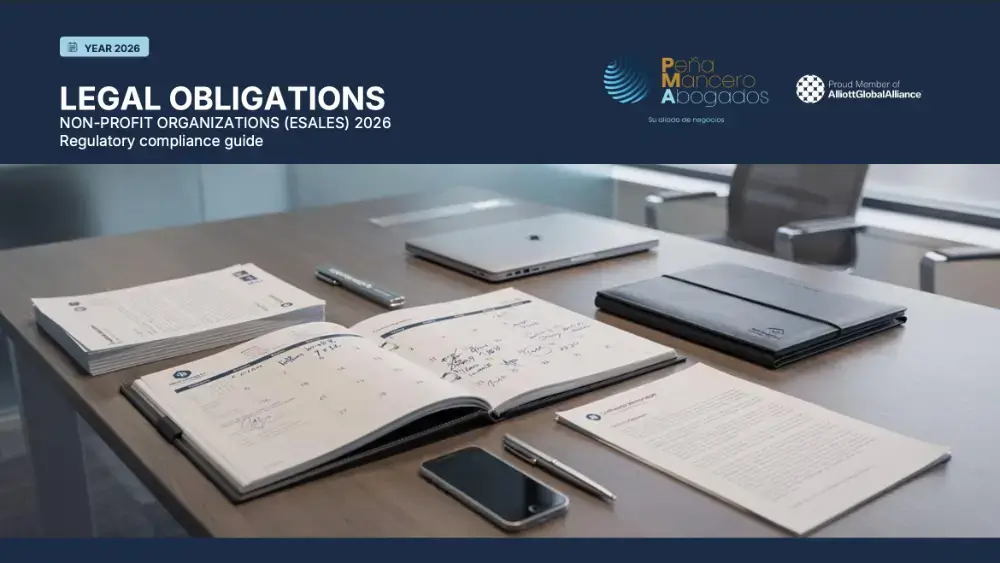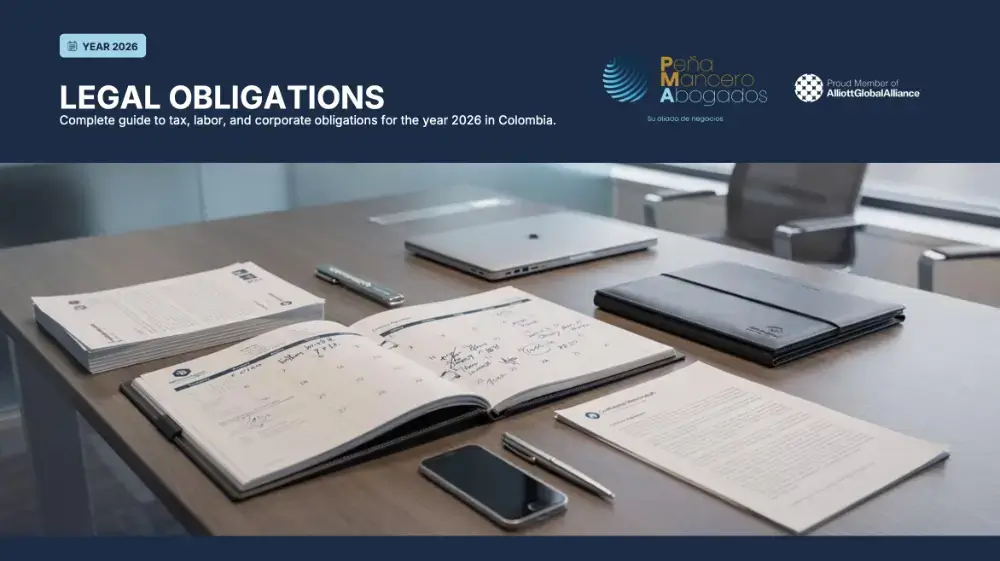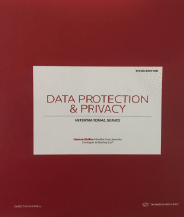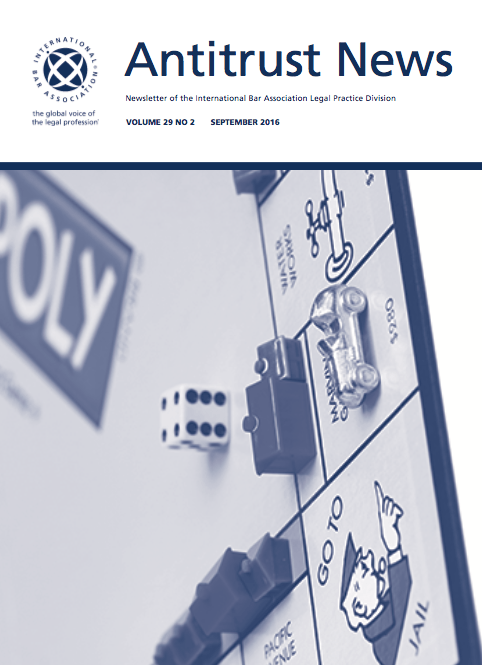
Legal obligations non-profit organizations (ESALES) 2026

Legal obligations complete guide to tax, labor, and corporate obligations for the year 2026 in Colombia

International Arbitral Awards and Their Enforcement: Lessons from Colombia’s Article 28 of Law 2540 (2025) in Comparative Perspective
By Daniel Peña Valenzuela, Partner Peña Mancero Abogado
Introduction
The enforcement of arbitral awards remains one of the most critical dimensions of arbitration, as it determines whether the adjudicatory process achieves practical effectiveness. While the New York Convention (1958) established a global framework for the recognition and enforcement of foreign arbitral awards, national legislations continue to innovate in regulating the execution of domestic and international awards. Colombia’s Law 2540 of 2025, which will enter into force on February 27, 2026, introduces significant reforms in this regard. Article 28 of the statute allows domestic arbitral awards to be executed before the same arbitral tribunal that rendered them, provided the request is made within ten business days of notification. This reform contrasts with the previous regime under Law 1563 of 2012, which required parties to seek enforcement before ordinary courts.
This paper examines the Colombian innovation, situates it within the broader international landscape, and compares it with practices in jurisdictions such as France, the United States, and Singapore. The analysis highlights both the potential efficiencies and the limitations of Colombia’s approach, particularly in relation to international arbitral awards and matters involving public entities.
The Colombian Reform: Article 28 of Law 2540 (2025)
-
Scope of Application: Domestic arbitral awards, conciliations, and settlements approved by arbitral tribunals may be executed before the same tribunal, subject to a strict ten-day deadline.
-
Procedural Mechanism:
-
In tribunals of three arbitrators, the president acts as executor, or another arbitrator in alphabetical order if the president declines.
-
In sole-arbitrator tribunals, the arbitrator may act as executor upon acceptance.
-
If no arbitrator accepts, the arbitration center designates an executor from its roster.
-
-
Limitations:
-
Execution is only possible if the arbitration agreement expressly provides for an arbitral enforcement procedure.
-
If the deadline lapses, a new arbitral tribunal must be convened to enforce the award.
-
Awards involving public entities or administrative functions are excluded from execution before the same tribunal.
-
This framework reflects a hybrid model: it strengthens arbitral autonomy while preserving judicial oversight in cases where deadlines expire or public interests are implicated.
Comparative Perspectives
-
France: French law requires arbitral awards to be declared enforceable by the juge de l’exequatur. The arbitral tribunal itself does not execute its award; judicial intervention is mandatory, ensuring uniformity and public control.
-
United States: Under the Federal Arbitration Act (FAA), arbitral awards must be confirmed by federal or state courts to become enforceable judgments. The arbitral tribunal has no role in execution, reflecting a strong reliance on judicial authority.
-
Singapore: The Singapore International Arbitration Act allows for swift enforcement of awards through the High Court, which issues enforcement orders. Efficiency is achieved through streamlined judicial procedures rather than arbitral self-execution.
-
Colombia’s Distinction: Unlike these jurisdictions, Colombia’s reform empowers arbitral tribunals to enforce their own awards, albeit within narrow procedural confines. This innovation seeks to reduce reliance on ordinary courts, but its strict deadlines and exclusions may limit practical effectiveness.
Conclusions
Colombia’s Article 28 of Law 2540 (2025) represents a bold experiment in arbitral self-enforcement. By allowing tribunals to execute their own awards, the reform enhances efficiency and reinforces party autonomy. However, its effectiveness depends on careful drafting of arbitration agreements and strict compliance with procedural deadlines.
Comparatively, most jurisdictions—France, the United States, Singapore—retain judicial involvement as a safeguard, prioritizing uniformity and public oversight over arbitral autonomy. Colombia’s model thus stands out as an innovative but cautious departure, balancing efficiency with limitations.
For international arbitration, the exclusion of awards involving public entities and the continued reliance on judicial enforcement for foreign awards align Colombia with global standards. Yet, the Colombian experiment may inspire debate on whether arbitral tribunals should play a more active role in enforcement, particularly in domestic contexts where efficiency gains are most needed.

PM LEGAL NEWS – JANUARY 2026
Government of Colombia – declaration of economic and social emergency.
The Government of Colombia, through Decree 1390 of December 22, 2025, has declared a State of Economic and Social Emergency across the national territory for an initial period of 30 days, extendable up to 90 days. This extraordinary measure has been adopted to address a severe fiscal deficit and to ensure the availability of resources for healthcare, public security, and disaster response.
The declaration is based on the following considerations:
- Increase in the Capitation Payment Unit (UPC) to Health Promotion Entities (EPS).
- Recent public order crisis.
- Threats and attacks against social leaders, with an estimated impact of COP 2.5 trillion.
- Withdrawal of financing bills for 2025 and 2026, which sought to raise COP 12 trillion and COP 16.3 trillion, respectively.
- Impact of the winter season, estimated at COP 0.5 trillion.
- Pending judicial rulings requiring payment of COP 1.5 trillion.
- Overdue contractual obligations amounting to COP 1.6 trillion.
- Restrictions on borrowing by the National Treasury.
During the emergency period, the Government is authorized to issue legislative decrees with the force of law. Once the initial term concludes, Congress will exercise political oversight and review the measures within ten days.
Although the decree does not immediately introduce new taxes or modify existing ones, it enables the issuance of decrees that may include fiscal or administrative measures to reduce the deficit. According to official figures, the fiscal deficit closed at 6.7% of GDP in 2024 and is projected to reach 7.1% of GDP in 2025, thereby justifying the declaration.
The Government of Colombia reaffirms its commitment to safeguarding economic stability, protecting social welfare, and ensuring the continuity of essential public services. Citizens and institutions are urged to remain attentive to forthcoming legislative decrees that may be enacted under this emergency framework.
Minimum wage and transportation allowance for the year 2026
Decrees 1469 and 1470, December 29, 2025
The legal monthly minimum wage for 2026 has been set at ONE MILLION SEVEN HUNDRED AND FIFTY THOUSAND NINE HUNDRED AND FIVE PESOS ($1,750,905).
The transportation allowance has been set at TWO HUNDRED FORTY-NINE THOUSAND NINETY-FIVE PESOS ($249,095).
Tax measures for 2026
Decree 1474, December 29, 2025, adopts temporary tax measures within the framework of the State of Economic, Social, and Ecological Emergency declared by the Government, with the objective of addressing the 2026 budget shortfall.
The measures include the following:
- Liquor will be subject to a 19% value‑added tax (VAT) on sales.
- Taxation of gambling conducted online, whether operated domestically or from abroad, is adjusted.
- VAT is excluded for postal traffic related to express deliveries.
- Goods for motor vehicles and motorcycles will be taxed at a 19% rate.
- The income tax rate applicable to the financial sector will be increased by fifteen percentage points.
- A temporary tax is established on the extraction of hydrocarbons and coal within the national territory.
- Financial considerations in the form of royalties referred to in Articles 360 and 361 of the Constitution shall not constitute a cost or deduction for taxpayers subject to them.
- Provisions regarding the excise tax on cigarettes and manufactured tobacco are added.
- Mechanisms are established for the temporary reduction of penalties and interest on arrears for persons subject to tax, customs, and exchange obligations administered by the DIAN, provided full payment is made from the effective date of this decree until March 31, 2026.
- The DIAN is authorized to carry out reconciliation processes in administrative litigation proceedings concerning tax, customs, and exchange matters, subject to specified litigation criteria.
- A tax for tax normalization is created, applying a 19% rate to assets that were omitted, not included in national tax returns despite a legal obligation to declare them, or that were undervalued.

Regulatory Convergence in the Digital Era: The Impact of the U.S. GENIUS Act on Stablecoins and Colombia’s Decree 1069 on Low-Value Payment Systems
By Daniel Peña Valenzuela, Partner Peña Mancero Abogados
1. Introduction
The rapid evolution of financial technologies has prompted governments worldwide to reassess their regulatory frameworks. This paper examines the intersection between the United States’ GENIUS Act—an ambitious legislative effort to regulate stablecoins—and Colombia’s Decree 1069 of October 2025, which modernizes the country’s low-value payment systems. By analyzing the implications of these two instruments, the paper explores how cross-border regulatory developments influence domestic financial ecosystems, particularly in emerging markets such as Colombia.
The digitization of financial services has catalyzed a paradigm shift in how payments are processed, assets are stored, and trust is established in economic transactions. In response, governments have begun to craft legislation that addresses the challenges and opportunities posed by digital currencies and decentralized payment infrastructures. The GENIUS Act in the United States and Colombia’s Decree 1069 represent two such efforts, each tailored to its respective jurisdiction yet sharing common regulatory aspirations. This paper investigates the potential synergies and tensions between these frameworks and their implications for Colombia’s financial sector.
2. The GENIUS Act: A New Regulatory Framework for Stablecoins
Enacted in July 2025, the GENIUS Act (Guaranteeing Essential National Infrastructure Using Stablecoins) constitutes the first comprehensive federal legislation in the United States aimed at regulating the issuance, circulation, and oversight of stablecoins. Key provisions of the Act include:
- Mandatory asset backing for stablecoin issuers, with reserves held in highly liquid instruments such as U.S. Treasury securities.
- Licensing requirements under the Federal Reserve and Securities and Exchange Commission (SEC), depending on the nature of the stablecoin.
- Obligations for interoperability with existing payment systems and digital wallets.
- Consumer protection mandates, including transparency in transaction fees, dispute resolution mechanisms, and data privacy safeguards.
The GENIUS Act positions stablecoins as legitimate instruments within the broader financial system, potentially paving the way for their integration into mainstream payment infrastructures. Its extraterritorial influence is particularly relevant for countries with strong financial ties to the U.S. or with significant remittance flows denominated in dollars.
3. Colombia’s Decree 1069: Reforming Low-Value Payment Systems
In October 2025, Colombia’s Ministry of Finance issued Decree 1069, a landmark regulation aimed at enhancing the efficiency, security, and accessibility of low-value payment systems. The decree mandates:
- Real-time interoperability among financial institutions with over 1.5 million active accounts.
- Minimum service availability thresholds of 99% per month for payment platforms.
- Standardized procedures for error correction and fraud mitigation.
- The establishment of the National Payments Council, a multi-stakeholder advisory body comprising representatives from the public and private sectors.
Decree 1069 reflects Colombia’s commitment to fostering financial inclusion and digital transformation. By prioritizing low-value transactions, the regulation targets the everyday financial needs of consumers and small businesses, which are often underserved by traditional banking models.
4. Points of Convergence: Regulatory Synergies and Strategic Alignment
Despite their distinct scopes and jurisdictions, the GENIUS Act and Decree 1069 exhibit notable areas of convergence. These include:
a. Interoperability as a Strategic Imperative
Both regulations underscore the importance of interoperability. The GENIUS Act requires stablecoins to integrate seamlessly with existing payment networks, while Decree 1069 enforces real-time interoperability among Colombian financial institutions. This shared emphasis facilitates cross-border transactions and lays the groundwork for stablecoin adoption in Colombia’s domestic payment landscape.
b. Consumer Protection and Trust
The GENIUS Act and Decree 1069 both prioritize consumer protection. The former mandates transparency and dispute resolution for stablecoin users, while the latter introduces protocols for error correction and fraud prevention in low-value payments. These provisions are essential for building trust in digital financial services, particularly among populations with limited financial literacy.
c. Institutional Coordination and Governance
The creation of the National Payments Council in Colombia and the dual oversight of stablecoins by U.S. regulatory agencies reflect a broader trend toward collaborative governance. Such institutional arrangements enable regulators to respond dynamically to technological innovations and market developments, while also fostering international dialogue on best practices.
5. Implications for Colombia’s Financial Ecosystem
The GENIUS Act’s enactment has several implications for Colombia, both direct and indirect:
a. Catalyzing Fintech Innovation
The regulatory clarity provided by the GENIUS Act may encourage U.S.-based stablecoin issuers to expand into emerging markets, including Colombia. This could stimulate competition and innovation within the Colombian fintech sector, particularly in areas such as remittances, peer-to-peer payments, and digital savings.
b. Risk of Disintermediation
The proliferation of stablecoins as payment instruments may challenge the traditional role of banks as intermediaries. Decree 1069 seeks to mitigate this risk by compelling banks to modernize their payment infrastructures and offer competitive digital services.
c. Regulatory Gaps and the Need for Harmonization
Colombia currently lacks a dedicated legal framework for stablecoins. The GENIUS Act may serve as a model for future legislation, helping Colombian regulators to define the legal status, operational requirements, and supervisory mechanisms for stablecoin issuers operating domestically.
6. Challenges and Opportunities
Challenges
- Regulatory Fragmentation: The absence of global standards for stablecoins may lead to jurisdictional conflicts and compliance burdens for cross-border operators.
- Technological Readiness: Colombian financial institutions must invest in infrastructure upgrades to meet the interoperability and availability standards set by Decree 1069.
- Public Awareness: The adoption of digital payment instruments requires robust consumer education initiatives to ensure informed usage and risk mitigation.
Opportunities
- Financial Inclusion: Stablecoins and low-value digital payments can extend financial services to underserved populations, particularly in rural and informal sectors.
- Cost Efficiency: Digital transactions reduce operational costs for businesses and consumers, enhancing economic productivity.
- Foreign Investment: A coherent and forward-looking regulatory environment may attract international fintech firms seeking expansion opportunities in Latin America.
7. Policy Recommendations
To capitalize on the regulatory momentum generated by the GENIUS Act and Decree 1069, Colombian policymakers should consider the following actions:
- Draft a comprehensive stablecoin law, incorporating lessons from the GENIUS Act and tailored to Colombia’s economic and technological context.
- Strengthen cybersecurity protocols for digital payment platforms, including mandatory audits and incident reporting mechanisms.
- Promote regional regulatory harmonization, particularly within the Pacific Alliance, to facilitate cross-border financial integration.
- Launch nationwide financial literacy campaigns, focusing on digital payments, data privacy, and fraud prevention.
Conclusion
The GENIUS Act and Decree 1069 represent pivotal steps in the global and local regulation of digital financial instruments. Their convergence illustrates a shared commitment to modernizing payment systems, enhancing consumer protection, and fostering innovation. For Colombia, the challenge lies in translating these regulatory developments into tangible improvements in financial inclusion, technological resilience, and economic competitiveness. By aligning domestic policy with international best practices, Colombia can position itself as a regional leader in the digital finance revolution.

Colombia: recent case law regarding commercial agency vs distribution contracts
by: Gabriela Mancero-Bucheli
In one of the most recent cases regarding commercial agency agreements in Colombia, the Superior Court of Bogotá clarified that economic risk does not, in itself, exclude the existence of a commercial agency. However, it is a determining factor when accompanied by operational independence, freedom to set prices, and absence of instructions from the contractor.
This article will discuss decision No. 11001 3103 045 2021 00461 01 by the Superior Court of Bogotá issued on May 12, 20251.1
Background of the case
MTBASE S.A.S. filed a lawsuit against SAP Colombia S.A.S., claiming that there was a commercial agency agreement between the two companies with an uninterrupted, continuous, and indefinite term from June 2, 1993, to December 31, 2019.
The plaintiff argued that the essential elements of an agency agreement were present, asserting that it had been entrusted with the promotion and market positioning of the product, in addition to carrying out technical functions associated with the commercialization of software licenses.
First Instance Judgment
The 45th Civil Court of the Bogotá Circuit ruled in favor of the plaintiff, finding that the primary purpose of the contracts was the distribution of software for resale, which could include support and complementary services offered directly by the plaintiff. The Court also noted that no contractual clause imposed agency duties on the plaintiff to act on behalf of the defendant for the purpose of positioning or growing the business in the software market, nor was there evidence that the plaintiff engaged in market development activities for the defendant’s benefit.
Appeal
The plaintiff appealed the first-instance judgment, arguing that, since the commercial agency agreement involved artistic works or creations (software), the legal transaction should have been registered with the National Copyright Office—evidence that the plaintiff never operated as a legal entity separate from the defendant. Furthermore, the technical support provided by the plaintiff to customers was delivered following training by the defendant, suggesting that “there was no distinction between the plaintiff and the defendant from the perspective of customers and the market”.
Superior Court of Bogota’s Analysis
The Superior Court of Bogotá analyzed the evidence and found that, contrary to what the appellant suggests, the case file shows that the contractual behavior of the parties, which lasted for 26 years, is consistent with the nature and content of a distribution contract.
The Court concluded that it was established that the plaintiff assumed the risks inherent in purchasing for resale, thereby undermining both the promotion of another’s business and the receipt of remuneration—elements intrinsic to a commercial agency contract. This was evidenced by sales invoices showing that customers acquired the software licenses directly from the plaintiff. Accordingly, the defendant did not pay commissions to the appellant; rather, its remuneration derived from the difference between the purchase price of the software licenses and the higher resale price charged to the consumers.
The decision stated:
““It is not without reason that case law has emphasized that, ‘although the essential elements of agency have been identified as the permanence or stability of the assignment, the independence of the agent, and the intermediary functions aimed at acquiring, retaining, expanding, or recovering customers for the principal, much of the doctrine agrees that it is the promotion of the conclusion of business—where the principal assumes the economic risk—that constitutes the typical content distinguishing the agency contract from other contractual arrangements, as the other elements may also be present in different types of agreements (…).’ Acting in the name and on behalf of a third party has been highlighted by this Chamber’s case law as the most decisive characteristic in determining whether the contract binding on the parties constitutes a commercial agency agreement. (CSJ, judgment of September 30, 2015, file 2004 00027)”.
The Court also emphasized that there is no written document or supporting evidence to substantiate the plaintiff’s claims. On the contrary, there is ample documentary evidence—including purchase invoices—supporting the first-instance judge’s conclusion that the plaintiff primarily acted by purchasing products from SAP COLOMBIA S.A.S. for resale to third parties.
Furthermore, as previously noted, the evidence shows that MTBASE S.A.S. remained silent for over two decades, thereby implicitly accepting the performance of services characteristic of a software license distribution agreement, rather than those of a commercial agency. This conduct runs contrary to fundamental legal principles, including the prohibition against acting in contradiction to one’s own prior conduct (venire contra factum proprium).
Conclusion
The Court concluded that no commercial agency agreement existed between the parties, as the plaintiff acted as an independent distributor, received no remuneration from the defendant since Its profit was derived not from a commission, but from the margin between the purchase and resale prices, and bore all business risks. Moreover, the plaintiff purchased licenses directly from the defendant and resold them under its own name, without any mandate of representation or direction from the defendant.
The decision clearly emphasized that economic risk is not incidental but an essential element, as its continuous presence precludes the existence of an agency relationship.
Gabriela Mancero-Bucheli, IDI Country Expert for agency and distribution in Colombia
Andrea Sánchez Gallardo

Arbitrating the future: Rethinking global dispute resolution in an age of strategic disruption –perspective 2035
Introduction
By 2035, international arbitration will be redefined not only by legal innovation but by its strategic relevance in a world marked by geopolitical fragmentation, technological acceleration, and ecological transition. Arbitration is no longer a peripheral mechanism for commercial disputes—it is becoming a central arena where states, corporations, and transnational actors negotiate power, legitimacy, and risk. As global governance becomes more contested and multipolar, arbitration must evolve to address complex disputes that reflect the strategic priorities of a rapidly transforming world.
Futures studies are not solely about forecasting what lies ahead—they critically examine the present to understand how current values, systems, and decisions shape possible futures. By analyzing today’s assumptions and power structures, the field reveals how the future is already being constructed in the now.
Its tools—like scenario planning and backcasting—depend on present trends and disruptions to imagine alternatives. This makes futures studies a strategic lens for rethinking today’s challenges, enabling more inclusive and anticipatory decisions grounded in current realities.
The evolution of international arbitration cannot be understood solely through the lens of legal development. While it shares structural similarities with other juridical institutions—such as codification, procedural refinement, and the emergence of specialized bodies—its trajectory has been uniquely shaped by the demands of cross-border commerce and the need for neutral dispute resolution mechanisms. Arbitration emerged as a pragmatic response to the limitations of national courts in handling transnational conflicts, especially in contexts where sovereignty, jurisdiction, and enforceability posed significant challenges.
Political and economic conditions have played a decisive role in shaping arbitration’s institutional architecture. From the rise of bilateral investment treaties (BITs) to the proliferation of free trade agreements, states have increasingly embraced arbitration as a tool for attracting foreign investment and mitigating geopolitical risk. The post–Cold War expansion of global markets, coupled with the liberalization of trade regimes, created fertile ground for arbitration to flourish. Institutions like ICSID and UNCITRAL gained prominence not just because of their legal sophistication, but because they offered predictability and legitimacy in politically sensitive environments.
Equally important has been the evolution of business practices and corporate strategies. As multinational enterprises expanded their operations across jurisdictions, the need for efficient, confidential, and enforceable dispute resolution mechanisms became paramount. Arbitration adapted to these needs by offering procedural flexibility, party autonomy, and enforceability under instruments like the New York Convention. Today, arbitration reflects a dynamic interplay between legal norms, commercial pragmatism, and geopolitical considerations—making it not just a legal institution, but a strategic instrument of global governance
Strategic pressures and emerging dispute frontiers
The idea of a “crisis” in arbitration often stems from concerns about legitimacy, transparency, cost, and consistency—especially in investor-state dispute settlement (ISDS). Critics argue that arbitration has become overly legalistic, expensive, and disconnected from the needs of affected communities or public interests. Some point to backlash from states revising or withdrawing from treaties, or to procedural fragmentation and unpredictability in arbitral outcomes.
Yet these very tensions may signal a renaissance rather than a decline. Arbitration is evolving—embracing reforms like greater transparency, diversity in arbitrator appointments, and procedural innovations. Crises, as some scholars argue, can catalyze transformation: pushing institutions to adapt, refine, and re-legitimize their roles. The rise of specialized tribunals, new codes of conduct, and broader stakeholder engagement suggests that arbitration is not collapsing but recalibrating—toward a more responsive and resilient future.
Multipolarity and the Rise of Strategic Arbitration
The erosion of unipolar legal consensus is giving way to a multipolar arbitration landscape. Regional arbitral centers are gaining prominence, not merely as alternatives to traditional institutions, but as strategic platforms aligned with national and regional interests. This shift reflects a broader recalibration of legal authority, where arbitration forums are selected not only for neutrality but for their capacity to reflect geopolitical alignments and regulatory preferences.
The international dispute resolution landscape has undergone a remarkable expansion, marked by the proliferation of specialized centers and forums across jurisdictions. Institutions such as the Singapore International Arbitration Centre (SIAC) https://siac.org.sg/ , the Mumbai Centre for International Arbitration (MCIA) https://mcia.org.in/ , and the International Arbitration and Mediation Centre in Hyderabad https://iamch.org.in/ have rapidly gained prominence, handling billions in cross-border disputes and reflecting a growing demand for regionally grounded, globally credible mechanisms. These centers offer not only arbitration but also mediation and hybrid models, responding to the need for flexible, efficient, and culturally attuned processes.
Simultaneously, the rise of international commercial courts (ICCs) in jurisdictions like Dubai, Abu Dhabi, Singapore, and post-Brexit Europe signals a strategic shift. These courts blend common law procedures with multilingual capabilities and international judicial expertise, positioning themselves as competitive alternatives to traditional arbitration. Their emergence reflects broader geopolitical and economic motivations—states seeking to project soft power, attract foreign investment, and establish themselves as legal hubs in the global economy.
This diversification of forums is not merely institutional—it’s conceptual. The growth of digital ADR platforms, AI-assisted resolution tools, and hybrid proceedings has redefined access and participation in global dispute resolution. As legal systems adapt to technological change and transnational complexity, the expansion of centers and forums represents not fragmentation but innovation. It signals a renaissance in dispute resolution—one that is more plural, responsive, and strategically aligned with the evolving contours of international commerce and governance.
In this context, arbitration becomes a tool of strategic positioning. States and corporations increasingly engage in forum selection and procedural design as part of broader geopolitical calculations. The rise of regional treaties and investment frameworks—often with embedded dispute resolution mechanisms—further reinforces the role of arbitration as a site of legal pluralism and strategic contestation.
Climate, Energy, and Resource Disputes
The global energy transition is generating a new wave of disputes centered on climate regulation, environmental obligations, and access to critical minerals. Arbitration will play a pivotal role in adjudicating conflicts over green infrastructure, carbon markets, and the reconfiguration of energy systems. These disputes are not merely commercial—they involve questions of sovereignty, ecological justice, and strategic resource control.
As states revise regulatory frameworks to meet climate targets, investors may challenge measures that affect profitability or asset valuation. Arbitration will need to reconcile investor protections with evolving environmental standards, balancing treaty obligations with planetary imperatives. The strategic importance of minerals such as lithium, cobalt, and rare earths will further intensify disputes over extraction rights, licensing regimes, and supply chain disruptions.
The protection of the environment and the global energy transition are increasingly intertwined as emerging matters of arbitrability, reshaping the contours of both commercial and investment arbitration. As states adopt climate policies—such as phasing out fossil fuels, regulating emissions, or incentivizing renewable energy—investors have begun challenging these measures under bilateral and multilateral treaties. Disputes over carbon pricing, feed-in tariffs, and retroactive changes to green energy incentives have already surfaced, revealing how environmental regulation and energy transition policies directly affect contractual and treaty-based expectations.
This convergence has also led to the rise of Environmental, Social, and Governance (ESG) clauses in contracts, which embed sustainability obligations into commercial relationships. These clauses are now being tested in arbitral forums, raising procedural and substantive questions about enforceability, jurisdiction, and public interest considerations. Arbitration is thus evolving to accommodate complex claims involving climate risk, regulatory change, and environmental harm—requiring tribunals to balance investor protections with sovereign rights to regulate for sustainability. Far from being peripheral, environmental and energy transition issues are becoming central to the future of arbitrability itself.
Technology, Dual-Use Innovation, and Strategic Sensitivities
Technological innovation—particularly in artificial intelligence, biotechnology, and dual-use systems—is reshaping the contours of transnational dispute resolution. Contracts involving sensitive technologies increasingly intersect with national security, data governance, and ethical regulation. Arbitration must adapt to handle disputes that involve proprietary algorithms, synthetic biology, and autonomous systems, often in contexts where confidentiality and strategic control are paramount.
These disputes require specialized procedural safeguards, technical expertise, and normative sensitivity. Arbitration will need to develop protocols for managing classified information, protecting intellectual property, and adjudicating claims that implicate both commercial interests and strategic imperatives. The convergence of technological and geopolitical risk will make arbitration a critical forum for navigating the boundaries of innovation and regulation.
By 2035, artificial intelligence will have become a structural component of international arbitration. AI systems will assist in case triage, jurisdictional analysis, and outcome prediction based on precedent and tribunal profiles. This integration will accelerate proceedings, reduce costs, and enhance argumentative coherence. However, it will also raise ethical challenges related to transparency, party autonomy, and algorithmic oversight. Arbitral institutions will have developed normative frameworks to ensure that technological intervention respects fundamental principles of due process.
Decentralized technologies such as blockchain will have transformed evidentiary management and award enforcement. Smart contracts will include self-executing arbitration clauses that trigger automated procedures upon breach. Digital evidence will be stored in verifiable custody chains, ensuring integrity and traceability. Arbitral awards will be encoded for instant recognition under international conventions, facilitating enforcement without jurisdictional friction. This infrastructure will consolidate arbitration as a reliable mechanism in environments marked by regulatory volatility.
Quantum computing and multilingual neural translation systems will have expanded the reach and sophistication of arbitration. Quantum algorithms will simulate complex normative conflicts and anticipate regulatory scenarios in investment, technology, and environmental disputes. Meanwhile, high-precision automatic translation will ensure full participation of linguistically diverse parties without sacrificing legal nuance. These technologies will redefine the role of arbitrators, who will not only interpret norms but mediate between divergent regulatory paradigms. Arbitration will become a strategic instrument for global cooperation and legal governance in times of disruption.
Institutional innovation and normative recalibration
Reconfiguring Legitimacy and Participation
The legitimacy of arbitration in the 2030 horizon will depend on its ability to incorporate broader stakeholder perspectives and respond to public interest concerns. Disputes involving environmental harm, indigenous rights, and social impact will require mechanisms that go beyond traditional party autonomy. Institutions must expand procedural inclusivity through tools such as third-party interventions, public hearings, and community representation.
This evolution reflects a strategic shift from arbitration as a private remedy to arbitration as a quasi-public forum. As disputes increasingly touch on global commons and collective goods, the legitimacy of arbitral outcomes will hinge on transparency, accountability, and normative coherence. Institutions must design procedures that accommodate plural interests while preserving procedural integrity and enforceability.
AI-Augmented Arbitration and Strategic Intelligence
Artificial intelligence will transform the practice of arbitration, not only through automation but through strategic intelligence. Predictive analytics, natural language processing, and decision-support systems will enhance case management, precedent analysis, and risk modeling. These tools will allow parties to simulate outcomes, optimize strategies, and anticipate arbitrator behavior.
However, the integration of AI raises strategic concerns about bias, opacity, and control. Institutions must establish governance frameworks that ensure algorithmic accountability, human oversight, and ethical compliance. Arbitration will become a hybrid space where human judgment and machine intelligence co-produce legal outcomes, requiring new standards of transparency and procedural fairness.
Treaty Reform and Sovereignty Reassertion
States are reasserting sovereignty through treaty reform, embedding clauses that protect regulatory autonomy in areas such as climate policy, public health, and financial stability. These reforms reflect a strategic recalibration of investment law, where the balance between investor protection and state discretion is being renegotiated.
Arbitrators will face complex interpretive challenges as they apply evolving treaty language to dynamic policy contexts. Disputes will increasingly involve questions of proportionality, necessity, and legitimacy, requiring arbitrators to engage with broader strategic rationales. The proliferation of overlapping treaties and regional frameworks will further complicate jurisdictional analysis and normative coherence.
Shaping the arbitrator of the future
Strategic Formation for a Complex Legal Landscape
The arbitrator of 2035 must be more than a legal technician—they must be a strategic interpreter of global complexity. As disputes increasingly involve overlapping jurisdictions, sensitive technologies, and contested norms, arbitrators will require a multidisciplinary formation that blends legal rigor with geopolitical awareness, technological literacy, and ethical discernment.
Gender has emerged as a pivotal issue in arbitration, not only as a matter of representation but as a structural concern shaping legitimacy, fairness, and institutional credibility. In 2023, leading arbitral institutions reported modest but meaningful increases in the appointment of women arbitrators—such as the ICC’s 29.7% rate of female confirmations and appointments. Yet disparities persist, especially when parties or co-arbitrators control nominations, where women are still selected significantly less often2. This imbalance has prompted initiatives like the Equal Representation in Arbitration Pledge and cross-institutional task forces to promote more inclusive appointment practices.
Beyond representation, gender is also influencing procedural norms and substantive expectations. Diverse tribunals are shown to enrich deliberation and enhance stakeholder trust, especially in disputes involving human rights, ESG obligations, or community impacts. Moreover, the arbitration community is increasingly recognizing that gender diversity cannot be reduced to binary metrics alone—it intersects with broader questions of identity, access, and equity. As arbitration evolves, gender is no longer a peripheral concern but a lens through which legitimacy, responsiveness, and global justice are being redefined.
Key dimensions of future arbitrator formation include
Geopolitical and Regulatory Fluency: Arbitrators must understand the strategic interests of states and corporations, the dynamics of regional legal systems, and the implications of treaty reform. Training should include modules on global governance, sovereignty frameworks, and the political economy of dispute resolution.
Technological Competence and Data Governance: With AI, biotech, and digital infrastructure at the heart of future disputes, arbitrators must be conversant in technical concepts such as algorithmic bias, cybersecurity, and intellectual property in emerging domains. This requires collaboration with engineers, data scientists, and ethicists in the design of training programs.
Environmental and Social Impact Analysis: As climate-related and ESG disputes proliferate, arbitrators must be equipped to evaluate environmental assessments, community impact reports, and sustainability metrics. This calls for integration of environmental law, social science, and stakeholder engagement methodologies into arbitrator education.
Procedural Innovation and Adaptive Design: The arbitrator of the future must be capable of tailoring procedures to complex, multi-party, and multi-norm disputes. This includes familiarity with hybrid mechanisms, digital hearings, and participatory tools such as amicus curiae and public consultations.
Ethical, Gender and Normative Reflexivity: Beyond neutrality, arbitrators must cultivate ethical reflexivity—an awareness of how legal decisions shape public goods, institutional legitimacy, and global norms. This includes recognizing how gender dynamics influence access to justice, procedural fairness, and the perception of arbitral authority. Training should incorporate case studies on gender bias, representational disparities, and the normative implications of inclusive adjudication in contested governance spaces.
Strategic Communication and Institutional Leadership: Arbitrators will increasingly serve as institutional actors, shaping the evolution of arbitral norms and practices. Gender-inclusive leadership is essential to this transformation. Arbitrators must be equipped to engage in strategic communication that reflects diverse stakeholder perspectives, promote equitable representation in appointments, and contribute to institutional reforms that embed gender parity and intersectional awareness into the arbitral ecosystem.
To achieve this, arbitral institutions, universities, and professional networks must collaborate in designing advanced curricula, simulation-based learning environments, and interdisciplinary certification programs. The formation of arbitrators must evolve from static legal instruction to dynamic strategic education, preparing them to navigate the volatile, plural, and high-stakes disputes of the coming decade.
Conclusion: Towards strategic arbitration in a complex world
By 2035, international arbitration will not only serve as a strategic instrument of global governance but also reflect the evolving demands of inclusivity, technological transformation, and regional pluralism. Gender diversity will be central to its legitimacy, moving beyond symbolic representation toward structural equity in appointments, leadership, and procedural design. Initiatives like the Equal Representation in Arbitration Pledge have laid groundwork, but deeper reforms are needed to address persistent disparities in party-nominated arbitrators and to ensure intersectional inclusion across gender, ethnicity, and professional background. A truly representative arbitral ecosystem will enhance trust, enrich deliberation, and align with broader global justice imperatives.
Technological transformation will redefine both the substance and procedure of arbitration. AI-assisted case management, digital evidence protocols, and virtual hearings will become standard, demanding new competencies in data analytics and ethics, and algorithmic accountability. Arbitration will also increasingly engage with disputes arising from emerging technologies—such as blockchain, quantum computing, and platform governance—requiring tribunals to interpret novel legal questions with interdisciplinary insight. Institutions must invest in tech-literate infrastructure and adaptive procedural rules to remain credible in this rapidly shifting terrain.

Data Protection & Privacy



